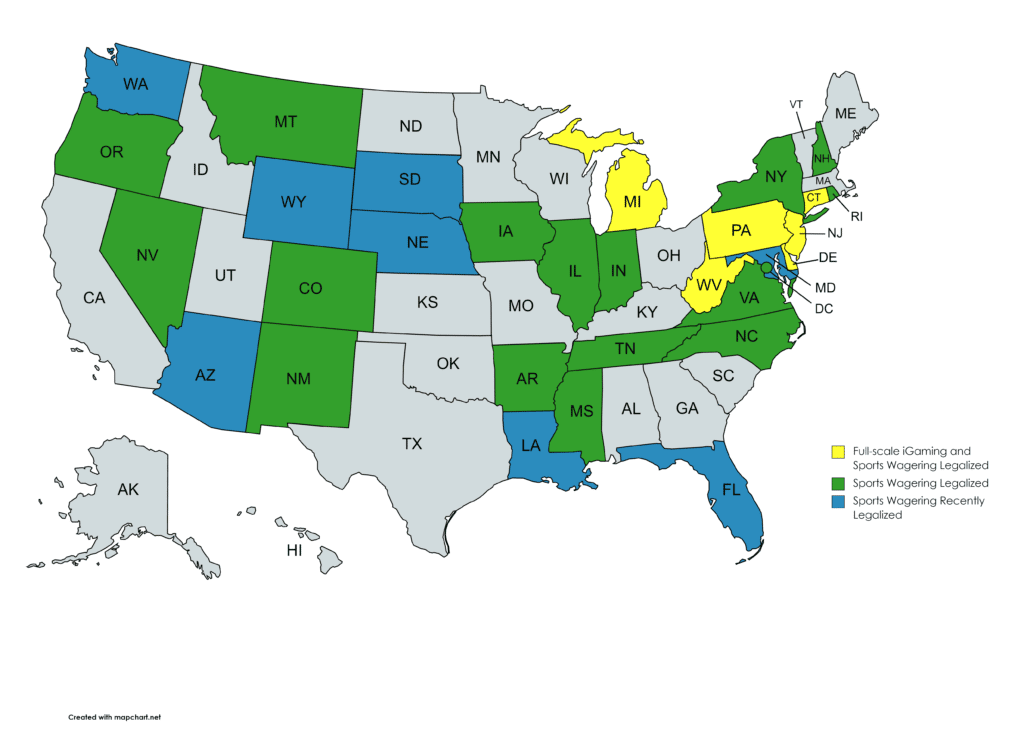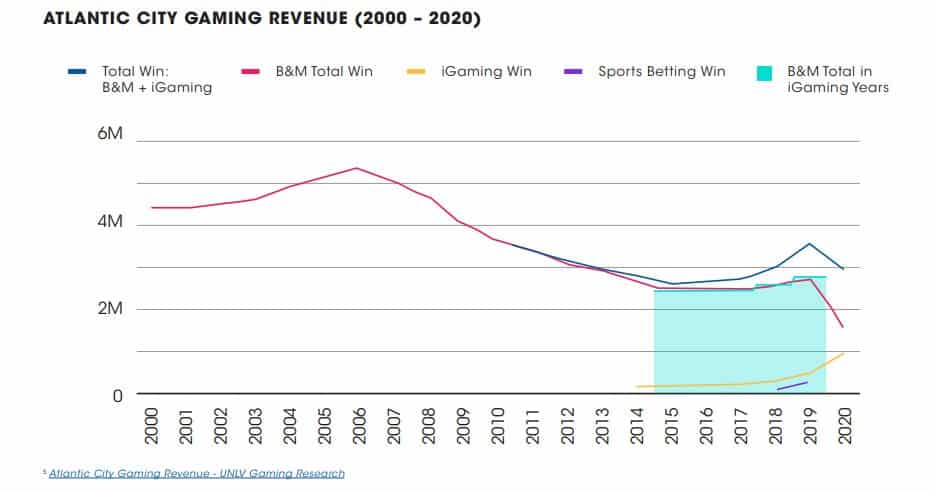ARTICLES
By Joseph Bunevith
![]()
2020 was a long year for everyone, especially those in the gaming industry. A global pandemic forced us to make changes to assure the health and safety of gaming customers. But for our industry, the transformation is still underway in a scope that appears to be larger than the virtual wheel, ticket-in-ticket-out, or cashless payments. We are witnessing movements of markets, technological solutions, and new content that better reflects how other, non-regulated entertainment industries can operate. Consumers will benefit, government treasuries will gain, industry employees will see a broader array of opportunities, and regulators will have more tools to control risk. After the uncertainty of the past year, it is truly a great time to be in gaming. 
Some of these changes were inevitable. For example, we knew that consumer desire for more convenient gaming and sports betting would eventually drive policy. But we needed a catalyst, and despite the great pain caused by COVID, it was uniquely influential in accelerating innovation, especially for markets requiring online delivery channels. With this in mind, let’s look at what changed, what was new, and what is here to stay in our ever-changing world of gaming.
Internet Gaming (iGaming) & Sports Betting – It has been a record year for iGaming. We saw massive growth in several sectors across many markets. With the closure of brick & mortar casinos, customers turned to the internet to get their entertainment. Currently, Delaware (2013), New Jersey (2013), Pennsylvania (2019), West Virginia (2020), and Michigan (2021) have full-scale iGaming (slots, casino games, lottery, poker.)
Many speculated that the iGaming market in the U.S. was positioned for rapid growth. However, the repeal of PASPA and COVID created a unique convergence of events that expedited the consumer learning curve. Two essential elements, (a) the breakdown of policymaker resistance to online delivery channels for gaming content; and (b) consumer isolation because of COVID, converged to drive rapid acceptance of online gaming technology to accelerate revenue growth.
So, what took so long?
iGaming has been live in New Jersey since 2013, and the projections were very bullish out the gate. Unfortunately, those projections and slow growth combined with deeply seeded fears about online gaming were substantial impediments to allowing gaming operators to use the same delivery channels as their competitors in the entertainment sector (e.g., movies, video games, sports, music, podcasts, books, etc.). The fears were based on uncertainty about preventing underage gambling, money laundering, increased problem gambling, or whether geolocation technology would work. Legislators and leaders of state governments were watching to see what would work and if there’d be issues. 
Then the Supreme Court reversed most aspects of the Professional and Amateur Sports Protection Act (PASPA), and mobile sports betting became widely accepted. Moreover, the technology for controlling the problems legislators feared proved to be highly effective. As a result, we haven’t experienced significant issues with the implementation of online gambling. On the contrary, regulators have more tools at their disposal to help measure and control consumer behavior.
As consumers have become more comfortable in using online gambling applications, tax revenues in the last twelve calendar months ($180.1M) have reached the projection set by the State Treasure in New Jersey in 2013 ($180M.)1 Moreover, we see an acceleration in the rate of consumer acceptance of online gaming as evidenced by the rapid growth in Pennsylvania, and recently, Michigan, the legislations of other states have noticed, implementing their own statutes. In 2021, Connecticut became the 6th state to allow full-scale iGaming with an estimated $50 Million in tax revenue for 2022.
The reversal of PASPA spurred a torrent of sports betting legislation. In three years, thirty states plus the District of Columbia have approved some form of sports betting. COVID was a critical factor in supercharging this trend as nine of those states have passed a bill just last year alone. In addition, eighteen other states have introduced a bill in their respective state legislations.
Many postulate that Fantasy Sports was the gateway to Sports Betting, and I agree. We are also seeing Sports Betting become the gateway to full online gaming, which leads us to our next market transformation fueled, at least in part, by COVID.
iGaming’s Growth and Impact on Brick & Mortar Casinos – iGaming is here to stay. And will only keep growing as operations have shown how to do it safely while creating tax revenues for their jurisdictions. 
But will it be streaming video replacing the DVD player?
The adage that the internet will take away what we once knew is not valid for iGaming. How’s that, you say? Well, let’s take a look at some data. Looking at Atlantic City, NJ, Brick & Mortar casino revenue over time, we can compare the iGaming revenue and possibly draw some conclusions.
Below you’ll find a graph of Atlantic City’s Brick and Mortar Total Win, iGaming Win, Sports Betting Win from the year 2000 to 2020. Once iGaming started to hit its stride in New Jersey, there is a lift from the downward trend of Atlantic City B&M revenue. Yes, sure, we need more time to evaluate the impact of COVID forcing people to stay in their homes, and we know correlation does not always equal causation. However, players are playing games on their phones and computers at home while earning reward points. Those same games are in the casinos of Atlantic City, and redeeming those reward points at the casinos will undoubtedly impact revenue.

Digital Payment & Reward Solutions – The movement to a cashless world was always happening. The pandemic became a perfect catalyst. A casino patron will no longer have to worry about carrying cash or leaving his reward card in a machine having to get in line to get a new one. They’ll now use their mobile phone, and with a single wave over a slot machine, they can deposit and get checked in for rewards.
In addition, single-digital-wallet solutions between B&M Casino and their online gaming application are coming. The player will make one deposit online and play the game in their home or come down and play the same game in the hotel on vacation without going to the casino cage. Yes, we all know that this will reallocate personnel, but these systems need support and create new opportunities. 
Plus, these systems have tighter I.D. Verification, Anti-Money Laundering (AML), and Responsible Gaming (R.G.) controls. Automated digital solutions allow for additional checks to limit the risk of fraudulent behavior. For example, the applications have configurable spending limits, cool-off periods, and one-click self-exclusion lists. In addition, a player can upload a picture of their Driver’s license, take a selfie, and the operator can instantly make an I.D. check against a verification database.
Digital Payments mitigate the friction for patrons. Friction is the online world’s definition of difficultly in user actions. Having to go to the bank, get cash, go park (and maybe pay for parking), walk into a casino, go to the cage, give them your account number, and cash to deposit is eliminated with several taps on their phone. This ease allows the user to have a more friendly experience with the game and the brand.
And, don’t worry, good marketing teams know how to reward customers to get them coming into their casinos by appealing to their interests like dining, shopping, spas, pool parties, or nightclubs. Plus, now the online user sees the experience of going into a casino as a reward. Clearly, the same thing can be said for online remote registration processes. And online casino jurisdictions that allow remote-sign-up have seen greater onboarding of customers, which has led to more foot traffic in their casino due to cross-marketing.
Resorts World Las Vegas, which opened June 24th, 2021, is one of the first cashless casinos in the world. I know what you are thinking, “wait, what?”, that’s right, it’s cashless. OK, OK, yes, you can still use cash at a blackjack table, but you can also use the mobile application to get chips to play. Plus, the chips have chips. That’s right. They have radio frequency identification (RFID) chips in the casino chips. This way, the resort knows what you are betting and can award you with accuracy. No more pit boss looking over the dealer’s shoulder to guess. Plus, you can use the same mobile app to get funds on and off a slot machine, pay for drinks, your room, dinner, or a show.
Virtual & Live-Streaming Content – The pandemic brought the cancellation or postponement of nearly all major sporting events for a few months between March and June 2020. This allowed the product lines for virtual horse racing, simulated games, eSports betting, and live-dealer products time to shine. Simulated sporting events of soccer and American football brought millions of dollars in handle as if sports bettors did not miss a beat.
The United Kingdom’s famed Grand National had a virtual race that saw significant betting action.
eSports saw significant increases in betting and viewership. While already on the rise, the pandemic lifted it to new heights. In April of 2020, moving quickly, the Nevada Gaming Control Board approved wagering on Counter-Strike Pro League Season, eNASCAR, Dota 2’s event ESL One Los Angeles, the League of Legends Championship Series, and the Call of Duty League.
So what does this all mean for me? As the world emerges from the pandemic, the gaming world will see these new markets, products, and games for many years to come. The key for regulators, operators, and players will be to embrace what they have to offer, expand it, cross-sell, and innovate well into our futures.
Suppose you are an operator, supplier, regulator, or legislator that is not in the game yet, that has been thinking about it, or is just curious. In that case, it’s time to start having conversations about iGaming and your business, jurisdiction, tribe, or state’s future. There are many experts out there to talk to; the technology and knowledge are here. It’s time to get into the game as iGaming is coming. And those businesses, jurisdictions, tribes, and states that have it now are ahead of the game and taking potential dollars that could benefit your interest. If you’ve been looking at iGaming and wondering if you should start digging in more, the time has come. Why? The last thing you’ll want is to be left on the bench watching it go by.
1 https://www.nj.gov/casinorevenue/reports/crfacannrpt2013.pdf Page 14
2 New Jersey Division of Gaming Enforcement
3 Pennsylvania Gaming Control Board
4 Michigan Gaming Control Board
5 Atlantic City Gaming Revenue – UNLV Gaming Research
![]()